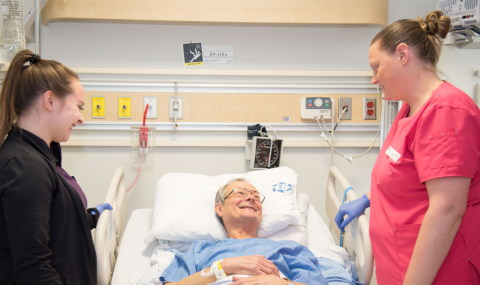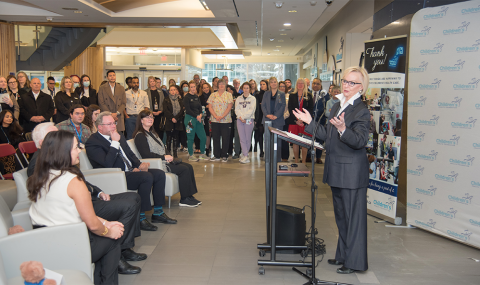July 14, 2017
Karina Charczuk has been working with Children’s Hospital at London Health Sciences Centre as a music therapist since January 2015. This role was created by a team at the hospital who recognized that a piece of the puzzle was missing. After a grant application for the music therapy position was accepted by the Children’s Health Foundation, the role became a reality.
Music therapy is a research based practice and an integral part of any multidisciplinary team. An accredited music therapist uses music, within a therapeutic relationship, to support any patient regardless of age, ability, culture, musical skill or severity of illness.
Music therapists use a variety of music based interventions in sessions, including music listening, instrument playing and song-writing, among others. It is through these interventions that music therapists can help patients with pain distraction, encouraging verbal and non-verbal communication, procedural support and providing an opportunity for emotional expression.
As Children’s Hospital’s Music Therapist, Karina works with patients from premature infants to adolescents and everything in between. With specialized clinical qualifications in addition to her music therapy degree, Karina is able to work with specific populations requiring special care, including premature infants and patients with acquired brain injuries. She may work with a patient for one or two sessions, or consistently over several years of treatment at the hospital.
Before joining LHSC, Karina completed her Masters of Music Therapy at the University of Melbourne in Australia, and worked as an independent contract music therapist in the Hamilton/Niagara region. It was in this role that she worked with individuals with diagnoses such as Alzheimer’s, Parkinson’s disease, traumatic brain injury, and Autism Spectrum Disorder. She also began the music therapy program at McMaster Children’s Hospital, which started at only 4 hours a week in its pilot phase, and grew into a three day per week program.
Karina is young at heart and enjoys working with and helping children and adolescents. Paired with her passion for music therapy, it has always been her goal to become a music therapist at a children’s hospital. When she found out that LHSC was hiring a music therapist to develop the program, she didn’t hesitate to apply – her vision had become her reality.
When asked about the most rewarding aspect of her role, Karina shared that being able to connect with a patient through music is something extremely special – this connection becomes the strong foundation for addressing therapeutic goals. In so many instances, she is referred to a patient who is withdrawing, is scared of staff members, refuses to speak to staff or is not engaging in anything in the hospital or their treatment. She shares, “it is amazing to see the power of music therapy when these patients slowly start to reach for an instrument to make a sound, begin to fill in the blanks of their favorite song, begin to make eye-contact with me or start to become assertive and make choices and voice their opinions or needs.”
According to Karina, what makes music therapy unique is that it can help with a wide variety of patients and needs, allows for varying levels of participation from very active to more receptive and does not require verbal communication. The music therapy program has provided a new and unique therapeutic modality to address the needs and goals of patients, and music therapy has quickly become an integral part of the holistic care that Children's Hospital provides.
The most challenging part of Karina’s role is changing people’s perception about what it is that music therapists do. As she describes, “I’m not a music teacher or an entertainer, but a music therapist. My job is to address specific goals, in a therapeutic relationship, using the medium of music. People see my cart and see toys, but they are specially chosen musical instruments that I use for therapeutic purposes," says Karina. "It is so wonderful to share that time with patients, and witness them forget about the hospital, the diagnosis, the pain. Everything melts away in our time together and music therapy helps the healthy child thrive in that moment."
When asked what she saw in store for the future of the role, Karina shared that she is looking forward to starting a music therapy internship program for Master of Music Therapy students. “Internships in paediatrics are hard to come by in Canada, so I would be able to train and educate music therapy students with this specific population.” She is also looking forward to solidifying the presence of music therapy in the NICU and on the Child and Adolescent Mental Health Unit. Having recently completed her NICU Music Therapy Specialization certification, Karina now has the skills to work with these very fragile patients, and being able bring these very effective interventions into our NICU is an exciting initiative.


